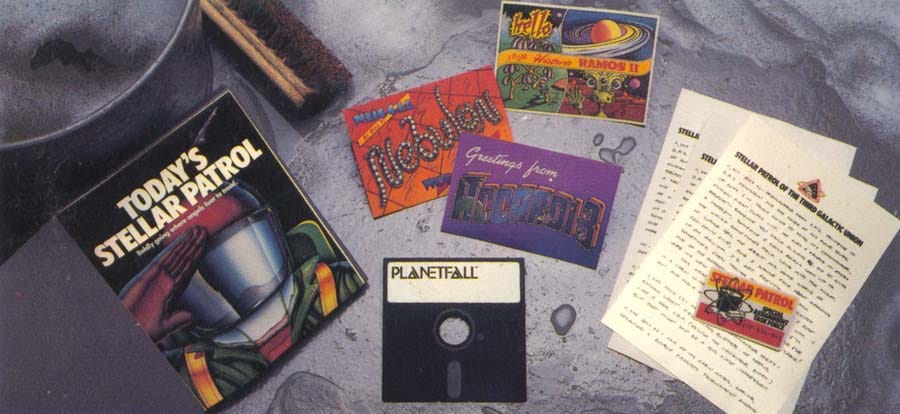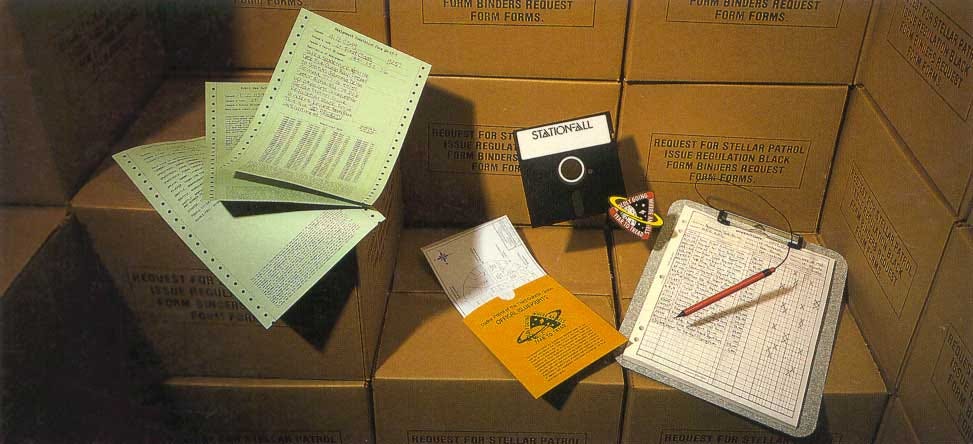The Classic PC Gaming Era (1977-1989) - Planetfall and Stationfall
Two hilarious and heartwarming adventure games show famed adventure game designer Steve Meretzky at his very best.
RELEASE DATE: 1983 (Planetfall) and 1987 (Stationfall)
DEVELOPER / PUBLISHER: Infocom
REPLAYABILITY: Highly playable

While some might argue that Planetfall is too popular a choice to appear in a series like this (it’s one of the few Infocom games you can still purchase legally for the PC through digital marketplaces like GOG or Steam, albeit as part of the Zork Anthology!), the truth is that few gamers are familiar with the game today by anything more than name. It’s their loss, because Planetfall is not only a fantastic adventure game, but also one of the funniest science fiction games this side of Space Quest (no accident, since space janitor Roger Wilco shares some obvious similarities to Planetfall’s mop-swinging protagonist).
It’s also the debut game by Steve Meretzky, the author of the four Zork gamebooks who soon after became the game designer who worked with author Douglas Adams to create the insidiously difficult The Hitchhiker’s Guide to the Galaxy text-based adventure game. Throughout the 1980s and 1990s, Meretzky became well-known among adventure game enthusiasts for his ability to combine comic sensibilities with great game design, and Planetfall is probably among the most influential interactive fiction games of the 1980s in showing a burgeoning generation of game developers how to fuse science fiction with humor in a manner that’s both entertaining and engaging.
Planetfall begins by thrusting the player, who carries the lowest possible rank of Ensign Seventh Class, into the awful task of mopping the deck of the galactic starcruiser S.P.S. Feinstein. The introduction allows you to have some comical interactions with your superior officer Ensign First Class Blather (who will actually imprison or even dismember you if you make him angry enough) and clean up the slime left behind by an alien ambassador. But before long, the ship starts to explode, and you have to make your way to the escape pod and land on a nearby planet – get the title now? – where your adventure truly begins.

Once you make it out of your escape pod and climb out of the water where it lands, you discover that the world where you’ve wound up is mysteriously deserted. As you walk around what appears to be the ruins of a planetary capital, you can see signs that sentient lifeforms were present recently. But as you explore over the course of an adventure that will span several days (complete with the game reminding you to eat and sleep), the only being you’ll find is a friendly little robot named Floyd, who is not only an amusing sidekick - he’s sort of like a talking R2D2 - but also at the heart of one of the most tragic scenes in all of adventure gaming. (Suffice it to say that you will learn to love the little guy, and you will definitely miss him when he’s gone.)
One of the things that’s notable about Planetfall is in how much time it spends building up its atmosphere before you actually get to the puzzle-solving. To support this, Planetfall also has some notably funny “feelies” – an ID card complete with your character’s serial number, a recruitment brochure designed to fill your head full of all the aspirational nonsense involved in recruiting you to join the Stellar Patrol (including a lengthy survey!), an amusing diary and some wonderfully silly postcards from different worlds.
After the success of Planetfall and 1984’s Sorcerer and The Hitchhiker’s Guide to the Galaxy, Steve Meretzky authored a far more serious (and quite polarizing) adventure game released in 1985 called A Mind Forever Voyaging. But as is so often the case when a game developer gets known for something distinctive, fans and critics were more interested in the Meretzky brand being focused on puzzles, humor and hijinks instead of more ambitious think-pieces. He returned to form with 1986’s Leather Goddesses of Phobos (detailed later in this section) and then finally, in 1987, got around to authoring a Planetfall sequel called Stationfall, fulfilling an electronic tongue-in-cheek promise made by Floyd in the earlier game that another adventure was on the way. It also wound up being Meretzky’s last pure text-based adventure game, and while it’s not quite as groundbreaking as Planetfall proved to be, it’s definitely a worthy follow-up that’s a superior game in many ways.

Stationfall begins with the player finding him or herself promoted to Lieutenant First Class and taking a desk job that’s only slightly more glamorous than mopping floors. A humorous requisition request results in your being reunited with Floyd and finding yourself exploring a deserted space station, where a talkative robot named Plato (think C-3PO) is wandering around. As in Planetfall, the game involves a lot of light humor and puzzle-solving until things get really serious. But the ending to Stationfall is much darker and contemplative than the one in Planetfall; it’s much like comparing the celebration at the end of the original Star Wars to the oppressive feeling of loss that closes out The Empire Strikes Back.
While it’s likely obvious that I consider nearly all of Steve Meretzky’s text-based adventure games worthwhile, I would argue that the Planetfall series is particularly essential because it not only contains two of the best games in the entire genre, but also captures a young and eventually influential adventure game developer at the beginning and end of his run on the text-based genre. These games are also just tough enough to be challenging, but not so difficult that you’ll be banging your head against the wall (aside from a few picky parser moments in Planetfall, that is). And whether you love or loathe Floyd, you have to admit that the fact that he makes you feel something despite just being depicted by words on a screen is a strong argument for how powerful interactive fiction can be.
If you need help playing either game, I’d recommend checking out The Infocom Gallery so you can look over the manuals and feelies (which contain some valuable hints!) and then consulting a walkthrough and map if you get really stuck. Just remember, part of the fun is solving the puzzles yourself, so grab some paper and a notepad and try to make your own map and notes before you give in to the temptation to consult the solution.
Side note: Planetfall and Stationfall were also adapted into novels, in this case by science fiction author Arthur Byron Cover. They are, sadly, not worth your time, as they lack all of the wit and fun of the games themselves, going instead for cheap laughs based on satirizing well-worn bureaucratic tropes and popular science fiction franchises. (There is a more contemporary novel series by Emma Newman also called Planetfall that is worth reading, but it’s unrelated.)
Another Note: Believe it or not, there was a space trading PC strategy game called Planetfall that was also released in 1983 by ASP Software. It’s unrelated.
Yet Another Note: In the 1990s, Activision began development on a graphical adventure game sequel in the style of Myst called Planetfall 2: Floyd’s Next Thing. You can read about it on Unseen64 and even watch two trailers. Suffice it to say I’m glad it was never released, as it had no involvement from Steve Meretzky and looks like it would have been a poor way to resurrect a great series.
As Our Series Continues…
In the coming weeks, we’ll talk about ASCII art games, graphical adventure games, 3D games, arcade action games, wargames, grand strategy games, RPGs, sports games, gameroom games, puzzle games and so much more.
And while you’ll definitely see some titles from prominent North American publishers like Sierra On-Line, Infocom, Activision, Electronic Arts, Brøderbund, SSI, MicroProse, Lucasfilm Games, Epyx and Sir-Tech in the mix, you’ll also see references to games from the United Kingdom, Australia, France, Spain and Japan.
I’ll also cover games written by unique personalities like Chris Crawford, Roberta Williams and Danielle Bunten Berry, by great writers like Steve Meretzky, Michael Bywater, Robert Pinsky and Brian Moriarty, and based on the work of famous authors like Michael Crichton, Ray Bradbury, Agatha Christie, William Gibson and Douglas Adams.
Anything I don’t share here will be in my upcoming book, tentatively titled The Greatest Games You (Probably) Never Played Vol. 1. Subscribe to this newsletter so you won’t miss it!



